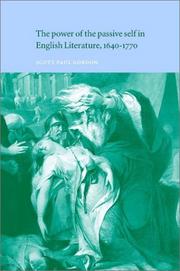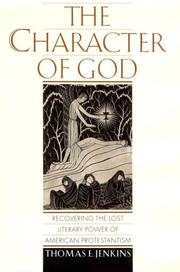| Listing 1 - 10 of 178 | << page >> |
Sort by
|
Periodical
ISSN: 20565666 Year: 1973 Publisher: [University Park, Pa.] : [London] : Baltimore, Maryland : [Conference on Christianity and Literature], SAGE Johns Hopkins University Press
Abstract | Keywords | Export | Availability | Bookmark
 Loading...
Loading...Choose an application
- Reference Manager
- EndNote
- RefWorks (Direct export to RefWorks)
Book
ISBN: 0802835961 9780802835963 Year: 1984 Publisher: Grand Rapids (Mich.): Eerdmans
Abstract | Keywords | Export | Availability | Bookmark
 Loading...
Loading...Choose an application
- Reference Manager
- EndNote
- RefWorks (Direct export to RefWorks)
Christianity and literature --- 82:2 --- Literature and Christianity --- Literature --- Christian literature --- Literatuur en godsdienst --- 82:2 Literatuur en godsdienst
Book
ISBN: 8817660906 Year: 1994 Publisher: Milano Rizzoli
Abstract | Keywords | Export | Availability | Bookmark
 Loading...
Loading...Choose an application
- Reference Manager
- EndNote
- RefWorks (Direct export to RefWorks)
Christianity and literature --- French literature --- Italian literature --- Literature, Modern --- Spanish literature --- Literature and Christianity --- Literature --- Christian literature --- History and criticism
Book
ISBN: 9004394486 9004394117 Year: 2019 Publisher: Leiden ; Boston : Brill,
Abstract | Keywords | Export | Availability | Bookmark
 Loading...
Loading...Choose an application
- Reference Manager
- EndNote
- RefWorks (Direct export to RefWorks)
Literary Representations of Christianity in Late Qing and Republican China contributes to the “literary turn” in the study of Chinese Christianity by foregrounding the importance of literary texts, including the major genres of Chinese Christian literature (novels, drama and poetry) of the late Qing and Republican periods. These multifarious types of texts demonstrated the multiple representations and dynamic scenes of Christianity, where Christian imageries and symbolism were transformed by linguistic manipulation into new contextualized forms which nurtured distinctive new fruits of literature and modernized the literary landscape of Chinese literature. The study of the composition and poetics of Chinese Christian literary works helps us rediscover the concerns, priorities, textual strategies of the Christian writers, the cross-cultural challenges involved, and the reception of the Bible.
Christian literature. --- Christianity and literature --- Literature and Christianity --- Literature --- Christian literature --- Christian writings --- Religious literature --- China --- Church history.
Book
ISBN: 1282796623 9786612796623 0231521804 0231151063 9780231511061 Year: 2010 Publisher: New York : Columbia University Press,
Abstract | Keywords | Export | Availability | Bookmark
 Loading...
Loading...Choose an application
- Reference Manager
- EndNote
- RefWorks (Direct export to RefWorks)
As religious leaders, ministers are often assumed to embody the faith of the institution they represent. As cultural symbols, they reflect subtle changes in society and belief-specifically people's perception of God and the evolving role of the church. For more than forty years, Douglas Alan Walrath has tracked changing patterns of belief and church participation in American society, and his research has revealed a particularly fascinating trend: portrayals of ministers in American fiction mirror changing perceptions of the Protestant church and a Protestant God. From the novels of Harriet Beecher Stowe, who portrays ministers as faithful Calvinists, to the works of Herman Melville, who challenges Calvinism to its very core, Walrath considers a variety of fictional ministers, including Garrison Keillor's Lake Woebegon Lutherans and Gail Godwin's women clergy. He identifies a range of types: religious misfits, harsh Puritans, incorrigible scoundrels, secular businessmen, perpetrators of oppression, victims of belief, prudent believers, phony preachers, reactionaries, and social activists. He concludes with the modern legacy of nineteenth- and early-twentieth-century images of ministers, which highlights the ongoing challenges that skepticism, secularization, and science have brought to today's religious leaders and fictional counterparts. Displacing the Divine offers a novel encounter with social change, giving the reader access, through the intimacy and humanity of literature, to the evolving character of an American tradition.
American fiction --- Clergy in literature. --- Christianity and literature --- Literature and Christianity --- Literature --- Christian literature --- History and criticism. --- History.
Book
ISBN: 9789463710145 9463710140 Year: 2018 Publisher: Oud-Turnhout Gompel & Svacina
Abstract | Keywords | Export | Availability | Bookmark
 Loading...
Loading...Choose an application
- Reference Manager
- EndNote
- RefWorks (Direct export to RefWorks)
Rond het thema 'Literatuur en christendom' heeft Hans van Stralen zeer diverse essays geschreven die zijn geïnspireerd op het gelijknamige college dat hij al enige jaren aan de Universiteit Utrecht geeft. In talloze literaire teksten is de relatie met christelijke thema's direct duidelijk (men denke bijvoorbeeld aan Phèdre, de jansenistische tragedie van Jean Racine). Maar na 1945 zijn de verbanden meer verborgen, zoals in het werk van Hugo Claus en Albert Camus. Omdat we in een postchristelijke maatschappij leven, is het zinvol niet alleen deze sluimerende maar ook de evidente connecties zichtbaar te maken. Voorts heeft de auteur theoretische beschouwingen gewijd aan de verhouding tussen christelijke en literaire teksten en aan de verbanden tussen het gebed en het gedicht. Daarnaast behandelt zijn boek de bekering, de apologie en de erfzonde in de literatuur.
Christian religion --- Comparative literature --- Christelijke godsdienst --- Vergelijkende letterkunde --- Christianity and literature --- Literature, Modern --- History and criticism --- Literature and Christianity --- Literature --- Christian literature
Book
ISBN: 9789463711517 9463711511 Year: 2019 Publisher: 's-Hertogenbosch Gompel&Svacina
Abstract | Keywords | Export | Availability | Bookmark
 Loading...
Loading...Choose an application
- Reference Manager
- EndNote
- RefWorks (Direct export to RefWorks)
Dit boek bespreekt het literaire werk van schrijvers en theologen die vanuit hun marginale positie binnen het christendom behartigenswaardige zaken aan de orde stelden. Zo schreef Dietrich Bonhoeffer gedichten toen hij door de nazi’s gevangen werd gehouden. Ze geven zijn uitgesproken beeld van het christelijke geloof aan. Thomas Merton publiceerde erudiete kritieken waaruit zijn eigenzinnige geloofsbeleving blijkt. Gerard Walschap en Marnix Gijsen keerden zich op een intensieve en strijdbare wijze van het christendom af. Amos Oz schetst in zijn roman ‘Judas’ deze apostel als een buitenstaander die de bekende gang van zaken vanuit een originele focus benadert. De chansonnier Georges Brassens bezingt God na de Tweede Wereldoorlog als een machteloze instantie, waarvan de mondige mens afscheid moet nemen. In ‘De zwarte Messias’ staat een tegendraads beeld van Jezus, zoals beschreven is in het Zuid-Afrikaanse toneelstuk ‘Woza Albert!’, centraal. In het essay over het leven van Franciscus van Assisi ten slotte wordt de ultrakatholieke visie van Julien Green belicht.
Christian religion --- Comparative literature --- Christianity and literature --- Literature, Modern --- History and criticism --- Literature and Christianity --- Literature --- Christian literature --- 82:2 --- Literatuur en godsdienst --- 82:2 Literatuur en godsdienst

ISBN: 1107125057 0511042124 1280159553 0511120079 0511157037 0511329490 0511484259 051104495X 9780511042126 9780521810050 0521810051 9780511120077 9780511484254 9780511044953 9780511157035 9781280159558 9780521021845 0521021847 Year: 2002 Publisher: Cambridge Cambridge University Press
Abstract | Keywords | Export | Availability | Bookmark
 Loading...
Loading...Choose an application
- Reference Manager
- EndNote
- RefWorks (Direct export to RefWorks)
Challenging recent work that contends that seventeenth-century English discourses privilege the notion of a self-enclosed, self-sufficient individual, The Power of the Passive Self in English Literature recovers a counter-tradition that imagines selves as more passively prompted than actively choosing. This tradition - which Scott Paul Gordon locates in seventeenth-century religious discourse, in early eighteenth-century moral philosophy, in mid eighteenth-century acting theory, and in the emergent novel - resists autonomy and defers agency from the individual to an external 'prompter'. Gordon argues that the trope of passivity aims to guarantee a disinterested self in a culture that was increasingly convinced that every deliberate action involves calculating one's own interest. Gordon traces the origins of such ideas from their roots in the non-conformist religious tradition to their flowering in one of the central texts of eighteenth-century literature, Samuel Richardson's Clarissa.
English literature --- Passivity (Psychology) in literature. --- Christianity and literature --- Ethics in literature. --- Self in literature. --- Literature and Christianity --- Literature --- Christian literature --- History and criticism. --- History --- Arts and Humanities

ISBN: 1280453605 0195354699 0585254109 9780585254104 0195112024 9780195112023 0197738524 Year: 1997 Publisher: New York : Oxford University Press,
Abstract | Keywords | Export | Availability | Bookmark
 Loading...
Loading...Choose an application
- Reference Manager
- EndNote
- RefWorks (Direct export to RefWorks)
Jenkins maintains that theology became boring because the depiction of God as a character became boring, fashioned according to theologians' notions of character, derived from contemporary literature. He considers why this was problematic.
Christianity and literature --- God (Christianity) --- Protestant churches --- Protestant sects --- Christian sects --- Protestantism --- Christianity --- Trinity --- Literature and Christianity --- Literature --- Christian literature --- History --- Attributes --- History of doctrines --- Doctrines --- God
Book
ISBN: 1138110620 1315728737 1317543815 1844658791 9781317543817 9781317543800 1317543807 9781317543794 1317543793 9781317543817 9781845539511 1845539516 9781845539528 1845539524 9781315728735 9781138110625 132215774X Year: 2012 Publisher: Durham : Acumen Publishing,
Abstract | Keywords | Export | Availability | Bookmark
 Loading...
Loading...Choose an application
- Reference Manager
- EndNote
- RefWorks (Direct export to RefWorks)
The book explores the preoccupation of key twentieth-century English writers with theology and sexuality and how the Anglican Church has responded and continues to respond to the issue of homosexuality. Analysing the work of Oscar Wilde, E. F. Benson, Edward Carpenter, Jeanette Winterson, and Alan Hollingshurst, the book explores the literary tradition of exasperation at the church's obduracy against homosexuality.
English fiction --- Homosexuality in literature. --- Christianity and literature --- Homosexuality --- Literature and Christianity --- Literature --- Christian literature --- History and criticism. --- History --- Religious aspects --- Anglican Communion.
| Listing 1 - 10 of 178 | << page >> |
Sort by
|

 Search
Search Feedback
Feedback About UniCat
About UniCat  Help
Help News
News